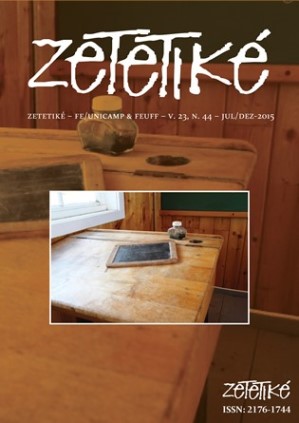Abstract
Based on the results of research on teacher education, the present study aimed to investigate and mapping teachers’ mathematical knowledge when they think about and they prepare their classes about equation. We take as theoretical framework the results of researches from Ball and her colleagues, in particular, the concepts of "knowledge of content and students" and "knowledge of content and teaching". From a methodological point of view, we have developed a qualitative-interpretive research involving a group of six teachers. Among the results we identified elements of the "knowledge of equation and students", as the difficulty of students to characterize the concept of the equation, as well as elements of the "knowledge of equation and teaching" as the appreciation of the context in the moment to prepare teaching activities of the equation. This study ratifies the relevance of investigating teachers involved in their own practice, particularly at the moment of preparation of their classes.References
Attorps, I. (2003, February/March). Teachers’ Images of the ‘Equation’ Concept. In CERME 3: Third Conference of the European Society for Research in Mathematics education in Bellaria, Italy. Disponível em http://www.dm.unipi.it/~didattica/CERME3/proceedings/Groups/TG1/TG1_attorps_cerme3.pdf
Ball, D.L., Thames, M.H., & Phelps, G. (2008). Content knowledge for teaching: What makes it special? Journal of Teacher Education 59, 389-407.
Benayad, M.A. (2012). Analyse des besoins en formation des enseignants de mathématiques du secondaire. In J.L. Dorier, & S. Coutat (Eds.), Enseignement des mathématiques et contrat social: enjeux et défis pour le 21e siècle – Actes du colloque EMF2012 (SPE1, pp. 1479-1487.
Bogdan, R., & Biklen, S.K. (1994). Investigação qualitativa em educação: uma introdução à teoria e aos métodos (Maria J. Álvares, Sara B. dos Santos, & Telmo M. Baptista, trads.). Porto:Porto Editora.
Brasil. (1997). Secretaria de Educação Fundamental. Parâmetros curriculares nacionais: matemática. Brasília, DF: Ministério da Educação.
Charalambous, C.Y. (2008). Mathematical knowledge for teaching and teaching practices: a virtual-design approach to study a complex relationship. In 11th International Congress on Mathematical Education, Topic Study 27: Mathematical knowledge for teaching. Monterrey, México.
Creswell, J.W. (2010). Projeto de pesquisa: métodos qualitativos, quantitativos e misto (3a ed.).Porto Alegre: Artmed, 296 pp.
Doerr, H.M. (2004). Teachers’ knowledge and teaching of algebra. In K. Stancey, H. Chick, & M. Kendal, (Eds.), The future of the teaching and learning of algebra: The 12th ICMI Study (pp. 267-289). New York: Kluwer Academic Publishers.
Dreyfus, T., & Hoch, M. (2004). Equations: a structural approach. Proceedings of the 28th Conference of International Group for the PME (pp. 1-152 – 1-155).
Figueiredo, A. (2007). Saberes e concepções de educação algébrica em um curso de licenciatura em Matemática. Tese de Doutorado, Pontifícia Universidade Católica de São Paulo, São Paulo, 290 pp.
Fiorentini, D. (2000). Pesquisando com professores – reflexões sobre o processo de produção e ressignificação dos saberes da profissão docente. In J.F. Matos & E. Fernandes (Eds). Investigação em Educação Matemática – perspectivas e problemas (pp.187-195). Lisboa: APM.
Fiorentini, D. (2005). A formação matemática e didático-pedagógica nas disciplinas da licenciatura em matemática. Revista em Educação PUC-Campinas, 18, 107-115.
Fiorentini, D. (2012). Formação de professores a partir da vivência e da análise de práticas exploratório-investigativas e problematizadoras de ensinar e aprender matemática. Cuadernos de Investigación y Formación en Educación Matemática, 7 (10), 63-78.
Hill, H.C., Rowan, B., & Ball, D.L. (2005). Effects of teachers’ Mathematica knowledge for teaching on student achievement. American Educational Research Journal, 42(2), 371-406.
Libâneo, J.C. (1993). Organização e gestão escolar: teoria e prática. Goiânia: Alternativa.
Lüdke, M., & André, M.E.D.A. (1986). Pesquisa em educação: abordagens qualitativas. São Paulo: EPU, 110pp.
National Council of Teachers of Mathematics. (2000). Principles and standards for school mathematics. Reston, VA: National Council of Teachers of Mathematics.
Oliveira, F.A.P.V.S. (2014). Analisando a mobilização de conhecimentos algébricos de profesores de educação básica: o momento de preparação de aulas sobre equações. Dissertação de Mestrado em Ensino, História e Filosofia das Ciências e da Matemática, Universidade Federal do ABC, Santo André, 161ff.
Ribeiro, A. J. (2001). Analisando o desempenho de alunos do Ensino Fundamental em Álgebra, com base em dados do SARESP. Dissertação de Mestrado em Educação Matemática, Pontifícia Universidade Católica de São Paulo, São Paulo, 145ff.
Shulman, L. (1986). Those who understand: Knowledge growth in teaching. Educational Researcher 15(2), 4-14.
Shulman, L. (1987). Knowledge and Teaching: Foundations of the New Reform. Harvard Educational Review 57(1), 1-22.
Stephens, M., & Ribeiro, A. J. (2012). Working towards algebra: the importance of relational thinking. Revista Latinoamerica de Investigación em Matemática Educativa, 15(3), 373-402.
Xu, W., Stephens, M., & Zhang, Q. (2012). Profiling students’ capacities to link Number and Algebra in years 5, 6 and 7 in Nanjing, China. In J. Dindyal, L.P. Cheng, & S.F. Ng (Eds.), Mathematics educations: Expanding horizons. Proceedings of the 35th annual conference of the Mathematics Education Research Group of Australia, pp.801-808.

This work is licensed under a Creative Commons Attribution-NonCommercial-NoDerivatives 4.0 International License.
Copyright (c) 2016 Zetetiké: Revista de Educação Matemática

